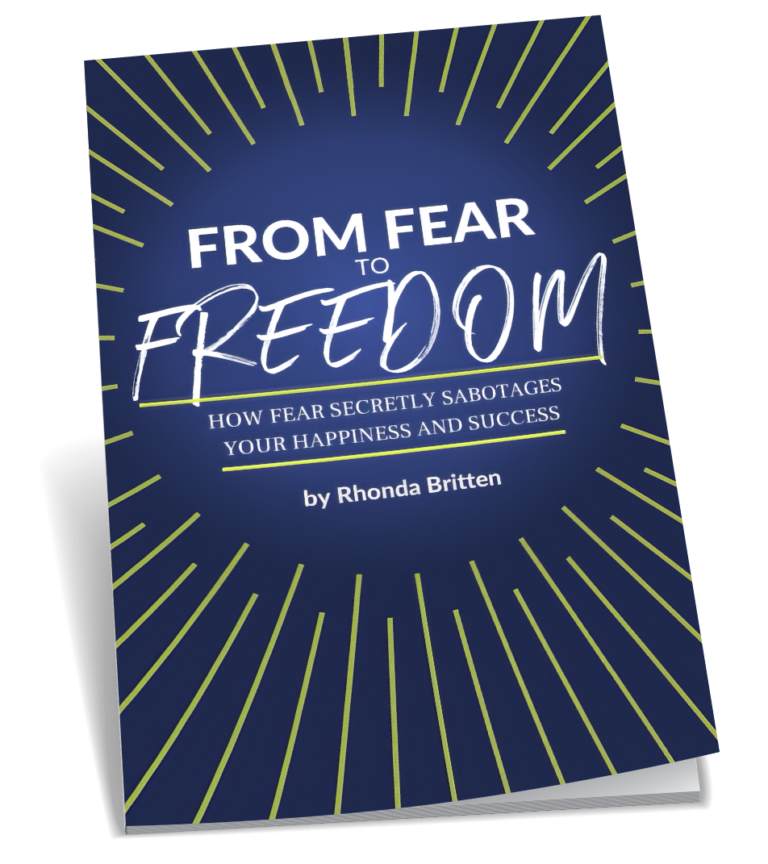Feelings are something we all have, even if, sometimes, we don’t want to. Feelings can be big and small, positive and negative, hot and cold, coffee or tea, and everything in between. Some feelings we want to embrace and hold onto forever.
We think, “If only I could feel this way all the time! I could do ANYTHING!” And some feelings we want to run away from or pretend don’t exist. “This is the worst feeling in the world! I want to crawl under my pillow and stay there FOREVER!”
There are so, so, SO many feelings we want to refuse to feel, either because they feel bad or because fear tells us we shouldn’t feel positive feelings.
But here’s the thing, folks: Pushing your inner feelings away doesn’t make them disappear. The more you try to deny your feelings, the stronger those feelings get. The less you express emotions, the more they bottle up. (Talk about a ticking time bomb! 💥)

Sure, we wish we could be happy all the time. Positive feelings are the BEST! When we’re happy, we feel like we’re on top of the world, capable of anything we put our hearts, minds, and spirits to. But when we’re sad, we want to crawl into a hole and hide away. The world is drained of its color. Things we enjoy just don’t seem like any fun anymore. Who wants to feel that way? And then there’s anger. When anger builds up, we want to tell anyone and everyone why they're wrong—BIG TIME!
Whether you are constantly ruled by your feelings, have trouble expressing your feelings, or do all you can to hide how you feel, this post is for you.
In this article, I will guide you on the path to expressing your feelings in a healthy and productive way. I’ll share why complaining is so harmful and how you can use the practice of venting to work toward solutions.
Why Is Expressing Your Feelings Important?
ALL, and I mean ALL, feelings are important. You can run from your negative emotions, but you can’t hide. And you shouldn’t.
When you deny the feelings moving through you, you deny yourself. You are pretending parts of you don't exist. But they do. And they will make themselves known whether you like it or not.
Let me put it this way: “The feeling that you’re afraid to feel is running your life.”
If you’re not willing to feel those feelings and work through them and move to the other side of them, the more you’ll remain stuck. You’ll always be unable to move from fear to freedom.
To be Fearless, you must face your feelings. You must express feelings to move through them. Expressing negative feelings must happen, or they’ll bottle up inside you until you explode. Everything raging inside of you, all those feelings you keep hidden, will sneak up on you when you least expect it.
Have you ever snapped at your kids for asking one too many questions? Have you ever lost it on an employee for being late or making a mistake? And then afterward you’re shocked by your own actions. You think, “Where did that come from? How could I be so mean?” Or maybe you turn that explosion inward and implode with negative self-talk and insults.
We’ve all been there—you bet I have! 🙋♀️ But let’s save the explosions for Arnold Schwarzenegger movies. You don’t need them in your life, and neither do your family members, friends, and coworkers.
Instead, work at expressing emotions as they surface so that they don’t bottle up and run the show. Talk your feelings through with someone you trust or take it to your journal. Claim your feelings. Own them. They are a part of you, and they’re trying to tell you something. They’re screaming for your attention!
You may have trouble expressing your feelings at first, and that’s perfectly okay. I’ve been there. And that’s why I’m telling you it will take practice. It will take willingness. It will take courage.
And reading this article is the first step. So, let’s talk about the healthy and unhealthy ways you can express your feelings. First, here’s what doesn’t work.
How We Usually Express Our Feelings: Complaining

Feelings want to be expressed, and as I just covered, trying not to express your feelings comes with big consequences. But far too often, expressing hurt feelings comes out in the form of complaining. Complaining is not a healthy way to express your feelings. But don’t worry—there is a healthier path. The solution is venting, and I’ll cover the benefits and how to vent effectively further below.
When you complain, you let your feelings take the wheel.
They are the captain now. You’re expressing your feelings, but not in a positive way.
Complaining is a simple way to get your feelings out, but it's not effective for processing those feelings. You can’t move through them fully and heal by complaining.
Do you resort to complaining as a way to process your feelings?
You’re not alone here. 🙋🏼♀️ We’ve all gone down the path of complaining, and I’m right there with you. I’ve done my fair share of complaining throughout my life, and during these times, not only was my complaining toxic to my own wellbeing, but it was also toxic to those around me.
Complaining kept me trapped in relationships with other complainers because, in my mind, they understood me. I thought they got me. I could complain to them, and they could complain to me.
I now call these people complaining buddies.
Complaining buddies want you to stay just as trapped as they are. They are caught up in an ongoing cycle of complaining and excuses that continue to prove them right (in their eyes). When you have a complaining buddy, you can feel better about yourself and your negativity. You’re correct, understood, and accepted, which makes you feel safe. You have a tribe. It may be a toxic one, but at least it’s a tribe!
Wanting a tribe of people who understand you is deeply ingrained in your DNA because, long ago, that was how we stayed safe. I cover this topic further in my guide to Overcoming Fear of Being Judged. If you’re worried you’re in a toxic relationship with a complaining buddy, I also recommend you read my article: 6 Signs You’re in a One-Sided Relationship.
To recognize whether or not you are complaining, ask yourself if you are focused on the problem or the solution.
Complaining keeps you stuck on the problem. When we complain, we simply repeat the problem over and over again, and this makes us feel good because hearing it feels like evidence. We are right. When we complain to other people, we’re trying to get them to see that we’re right.
Are you so focused on being right that you forget about everything else? When we’re complaining, we get caught up in wanting to be right more than wanting to be happy.
So, how do you flip the script to find a solution-focused method? It’s time to talk about the power of venting.
A Better Choice: Venting

I get it. You have a lot of feelings. We all do. And we all need to get that energy out, whether those feelings are anger, sadness, betrayal, frustration, guilt, suspicion, etc.
Let me repeat this again because it’s so, so, SO important. Recognize the feelings you feel.
Do you relate to any of the following feelings? How are you feeling right now, at this very moment?
You might feel…
- Angry
- Anxious
- Ashamed
- Betrayed
- Confident
- Content
- Discouraged
- Embarrassed
- Envious
- Excited
- Foolish
- Frustrated
- Grateful
- Guilty
- Hateful
- Hopeful
- Hopeless
- Humiliated
- Hurt
- Ignored
- Insecure
- Inspired
- Jealous
- Joyful
- Judged
- Lonely
- Misunderstood
- Optimistic
- Overwhelmed
- Passionate
- Powerful
- Powerless
- Resentful
- Sad
- Selfish
- Suspicious
- Threatened
- Trapped
- Vindictive
- Vulnerable
When we feel any feelings strongly, they must be acknowledged, and that may mean those feelings have to come out. It’s time to vent.
This is the healthy way to get those feelings out. Venting is an example of healthy emotional expression.
Venting allows you to express your feelings in a safe environment with someone you trust. This person acts as a sounding board so that you can clear yourself of all those negative feelings. The act of venting leaves space to find a solution once your venting session is complete.
Having all of those feelings building up and stuck inside you makes you not see straight. It creates a fog that clouds your judgment and prevents you from making good decisions. Sometimes these feelings can even leave you paralyzed and unable to make any decision or move forward at all. You’re stuck in your feelings.
Venting is a healthy form of emotional expression that allows you to move towards a solution, but it can only work if the exercise is done correctly.
How to Vent Effectively in 9 Steps
Venting only works if you follow the steps. You can’t just call up a friend and launch right into a venting session. That’s toxic for both you and your friend, and it will quickly turn back into complaining.
For venting to work, you must ask your venting partner for permission to vent, and they must agree. Venting requires consent.
Venting also requires a time limit. You can’t go on and on indefinitely. And you can’t extend the venting session to multiple calls or get-togethers. Your venting partner is offering a great service to you, so you don’t want to take advantage of their time.
You might ask, “Is now a good time for you? Would you be willing to listen to me vent without giving advice or coaching?”
They may say no. And that’s completely okay. The same is true for you. If a friend or Fearless community member comes to you with a request for a venting session, but you don’t have the capacity to hear them out, be honest, and say no. If it’s just a bad moment, consider suggesting a different time that works better for both of you.
Your backup plan is a good old notebook. Journaling allows you to vent anytime you need to if you can’t find a venting buddy or need to get more off your chest.
Fearbuster Exercise™:
- Pick a venting partner who is supportive and trustworthy.
- Explain that you want to vent and ask if they are available to support you.
- Establish a mutually agreed upon time to vent and a time limit for the session.
- Be clear about your venting partner’s job. They must avoid sharing wisdom, opinions, or advice. They must keep what they hear confidential. They must maintain objectivity and not take on the issue/emotion themselves.
- Now it’s time to fully vent within the agreed upon time frame.
- Take a deep breath, and remember to keep breathing.
- Request additional support if needed. For example, empathy for your experience.
- After venting, be sure to thank the listener for their support.
- Shift your focus. Make a new choice. Time for a new subject.
Repeat this exercise whenever you feel overwhelmed by your feelings or catch yourself falling back into a pattern of complaining. Remember, you can always take your venting to your journal if you can’t find a venting buddy or need to get more off your chest.
Common Questions About Expressing Feelings
How Do You Know What Your Feelings Are?
Sometimes it’s hard to identify our feelings. You may sense that something’s off, but you’re not exactly sure what. You know it’s not a feeling you like, but whatever it is, it’s been growing. You may feel sad or feel anxious, but you’re not sure why. And then, suddenly, someone does something that bothers you, and you erupt.
“LEAVE ME ALONE!”
“Can you PLEASE STOP TALKING TO ME!”
“I DON’T CARE WHAT YOU WEAR TO SCHOOL!”
If you just snapped at someone you care about, I mean really let them have it (whether they deserved it or not), I bet this isn’t the type of person you want to be. This extreme reaction is a sign from yourself. Your feelings are exploding out of you in an unhealthy, unproductive, and sometimes hurtful way.
Your negative feelings are causing you to react like this because your needs aren’t being met. That intuition, that gut feeling inside you, is telling you—screaming at you—something is wrong. Instead of addressing it and understanding your own feelings, needs, boundaries, etc., you’ve lashed out at someone else (or yourself). You’ve let your feelings and your underlying fear take over.
If you’re having trouble identifying your feelings or if you’re confused about why you're feeling a certain way, come back to your needs.
Are your needs being met? Is something happening that goes against your needs?
Your needs could be:
- Respect
- Safety
- Acceptance
- Space
- Friendship
- Honesty
- Harmony
- Trust
- Commitment
- Solitude
- Fairness
- Love
- Structure
- Faith
- Financial Stability
- Success
And so much more! Do you recognize any of your needs from that list? Are your needs being ignored, either by your family, friends, or yourself?
Trust me on this: When your needs aren’t being met, your feelings will let you know.
So, if you’re feeling upset but you’re not quite sure why, check in with your needs. What aren’t you getting right now? What’s missing? This is how you can begin to recognize and name your feelings. And once you understand your needs and your feelings, you can begin practicing expressing them to the people in your life.
How Do You Express Your Feelings in a Relationship?
What does expressing your emotions mean when it comes to your relationships? Expressing your feelings in a relationship is a different animal and a topic for a whole other article. But let me touch on it briefly here. Be sure to follow the Fearless Living blog for my latest articles, guides, and resources.
When it comes to your relationships, the real issue is often the relationship you have with yourself.
When you don’t know what your own needs are, what your own boundaries are, or what you’re looking for in a partner, it’s difficult to express your feelings and build healthy relationships, whether that’s with friends or a romantic partner.
Opening up takes time. If you are crippled by a fear of rejection, a fear of intimacy, a fear of being judged, or a fear of not being good enough, you’ll continue to struggle to express your feelings in a healthy way. Your relationships will be toxic. You won’t have boundaries, and there's a good chance your needs won’t be met either—cue negative feelings instead of healthy ones.
Focus on building your own Fearless confidence. You will be better equipped to express yourself in relationships and understand your partner's feelings if you have a clear understanding of your own needs and boundaries first. If you are struggling with your relationships, fear is very likely the culprit.
That said, sometimes a relationship is toxic, and there is no way around that. In a toxic relationship, your partner, friend, or family member may not be giving you the space to healthily express your feelings.
Find a Venting Partner at Fearless Living
At Fearless Living, we love, love, LOVE talking about our feelings. Even though it’s difficult, heart-wrenching, and painful work at times, we know that all feelings demand to be felt. Anytime you’re not willing to feel a feeling, you’re not willing to feel all feelings.
And what does that mean for you? It means you’re closing yourself off from happiness, your dream life, healthy relationships, and living the life your soul intended™.
If you’re ready to feel—and I mean really feel—you’re in the right place. Maybe you aren’t ready for all of those feelings yet, but you know you need a change. You’re stuck. You’re not living up to your desired potential, and you’re not living your dream life. It’s time to crack the secret code to the fear that’s been holding you back for so long.
I invite you to join our community at Fearless Living. You’ll learn how to name and express your feelings in a welcoming, kind, and nourishing environment. You’ll be able to build emotionally expressive, healthy relationships. And you’ll meet so many willing venting partners!
Feelings are something we all have, even if, sometimes, we don’t want to. Feelings can be big and small, positive and negative, hot and cold, coffee or tea, and everything in between. Some feelings we want to embrace and hold onto forever.
We think, “If only I could feel this way all the time! I could do ANYTHING!” And some feelings we want to run away from or pretend don’t exist. “This is the worst feeling in the world! I want to crawl under my pillow and stay there FOREVER!”
There are so, so, SO many feelings we want to refuse to feel, either because they feel bad or because fear tells us we shouldn’t feel positive feelings.
But here’s the thing, folks: Pushing your inner feelings away doesn’t make them disappear. The more you try to deny your feelings, the stronger those feelings get. The less you express emotions, the more they bottle up. (Talk about a ticking time bomb! 💥)

Sure, we wish we could be happy all the time. Positive feelings are the BEST! When we’re happy, we feel like we’re on top of the world, capable of anything we put our hearts, minds, and spirits to. But when we’re sad, we want to crawl into a hole and hide away. The world is drained of its color. Things we enjoy just don’t seem like any fun anymore. Who wants to feel that way? And then there’s anger. When anger builds up, we want to tell anyone and everyone why they're wrong—BIG TIME!
Whether you are constantly ruled by your feelings, have trouble expressing your feelings, or do all you can to hide how you feel, this post is for you.
In this article, I will guide you on the path to expressing your feelings in a healthy and productive way. I’ll share why complaining is so harmful and how you can use the practice of venting to work toward solutions.
Why Is Expressing Your Feelings Important?
ALL, and I mean ALL, feelings are important. You can run from your negative emotions, but you can’t hide. And you shouldn’t.
When you deny the feelings moving through you, you deny yourself. You are pretending parts of you don't exist. But they do. And they will make themselves known whether you like it or not.
Let me put it this way: “The feeling that you’re afraid to feel is running your life.”
If you’re not willing to feel those feelings and work through them and move to the other side of them, the more you’ll remain stuck. You’ll always be unable to move from fear to freedom.
To be Fearless, you must face your feelings. You must express feelings to move through them. Expressing negative feelings must happen, or they’ll bottle up inside you until you explode. Everything raging inside of you, all those feelings you keep hidden, will sneak up on you when you least expect it.
Have you ever snapped at your kids for asking one too many questions? Have you ever lost it on an employee for being late or making a mistake? And then afterward you’re shocked by your own actions. You think, “Where did that come from? How could I be so mean?” Or maybe you turn that explosion inward and implode with negative self-talk and insults.
We’ve all been there—you bet I have! 🙋♀️ But let’s save the explosions for Arnold Schwarzenegger movies. You don’t need them in your life, and neither do your family members, friends, and coworkers.
Instead, work at expressing emotions as they surface so that they don’t bottle up and run the show. Talk your feelings through with someone you trust or take it to your journal. Claim your feelings. Own them. They are a part of you, and they’re trying to tell you something. They’re screaming for your attention!
You may have trouble expressing your feelings at first, and that’s perfectly okay. I’ve been there. And that’s why I’m telling you it will take practice. It will take willingness. It will take courage.
And reading this article is the first step. So, let’s talk about the healthy and unhealthy ways you can express your feelings. First, here’s what doesn’t work.
How We Usually Express Our Feelings: Complaining

Feelings want to be expressed, and as I just covered, trying not to express your feelings comes with big consequences. But far too often, expressing hurt feelings comes out in the form of complaining. Complaining is not a healthy way to express your feelings. But don’t worry—there is a healthier path. The solution is venting, and I’ll cover the benefits and how to vent effectively further below.
When you complain, you let your feelings take the wheel.
They are the captain now. You’re expressing your feelings, but not in a positive way.
Complaining is a simple way to get your feelings out, but it's not effective for processing those feelings. You can’t move through them fully and heal by complaining.
Do you resort to complaining as a way to process your feelings?
You’re not alone here. 🙋🏼♀️ We’ve all gone down the path of complaining, and I’m right there with you. I’ve done my fair share of complaining throughout my life, and during these times, not only was my complaining toxic to my own wellbeing, but it was also toxic to those around me.
Complaining kept me trapped in relationships with other complainers because, in my mind, they understood me. I thought they got me. I could complain to them, and they could complain to me.
I now call these people complaining buddies.
Complaining buddies want you to stay just as trapped as they are. They are caught up in an ongoing cycle of complaining and excuses that continue to prove them right (in their eyes). When you have a complaining buddy, you can feel better about yourself and your negativity. You’re correct, understood, and accepted, which makes you feel safe. You have a tribe. It may be a toxic one, but at least it’s a tribe!
Wanting a tribe of people who understand you is deeply ingrained in your DNA because, long ago, that was how we stayed safe. I cover this topic further in my guide to Overcoming Fear of Being Judged. If you’re worried you’re in a toxic relationship with a complaining buddy, I also recommend you read my article: 6 Signs You’re in a One-Sided Relationship.
To recognize whether or not you are complaining, ask yourself if you are focused on the problem or the solution.
Complaining keeps you stuck on the problem. When we complain, we simply repeat the problem over and over again, and this makes us feel good because hearing it feels like evidence. We are right. When we complain to other people, we’re trying to get them to see that we’re right.
Are you so focused on being right that you forget about everything else? When we’re complaining, we get caught up in wanting to be right more than wanting to be happy.
So, how do you flip the script to find a solution-focused method? It’s time to talk about the power of venting.
A Better Choice: Venting

I get it. You have a lot of feelings. We all do. And we all need to get that energy out, whether those feelings are anger, sadness, betrayal, frustration, guilt, suspicion, etc.
Let me repeat this again because it’s so, so, SO important. Recognize the feelings you feel.
Do you relate to any of the following feelings? How are you feeling right now, at this very moment?
You might feel…
- Angry
- Anxious
- Ashamed
- Betrayed
- Confident
- Content
- Discouraged
- Embarrassed
- Envious
- Excited
- Foolish
- Frustrated
- Grateful
- Guilty
- Hateful
- Hopeful
- Hopeless
- Humiliated
- Hurt
- Ignored
- Insecure
- Inspired
- Jealous
- Joyful
- Judged
- Lonely
- Misunderstood
- Optimistic
- Overwhelmed
- Passionate
- Powerful
- Powerless
- Resentful
- Sad
- Selfish
- Suspicious
- Threatened
- Trapped
- Vindictive
- Vulnerable
When we feel any feelings strongly, they must be acknowledged, and that may mean those feelings have to come out. It’s time to vent.
This is the healthy way to get those feelings out. Venting is an example of healthy emotional expression.
Venting allows you to express your feelings in a safe environment with someone you trust. This person acts as a sounding board so that you can clear yourself of all those negative feelings. The act of venting leaves space to find a solution once your venting session is complete.
Having all of those feelings building up and stuck inside you makes you not see straight. It creates a fog that clouds your judgment and prevents you from making good decisions. Sometimes these feelings can even leave you paralyzed and unable to make any decision or move forward at all. You’re stuck in your feelings.
Venting is a healthy form of emotional expression that allows you to move towards a solution, but it can only work if the exercise is done correctly.
How to Vent Effectively in 9 Steps
Venting only works if you follow the steps. You can’t just call up a friend and launch right into a venting session. That’s toxic for both you and your friend, and it will quickly turn back into complaining.
For venting to work, you must ask your venting partner for permission to vent, and they must agree. Venting requires consent.
Venting also requires a time limit. You can’t go on and on indefinitely. And you can’t extend the venting session to multiple calls or get-togethers. Your venting partner is offering a great service to you, so you don’t want to take advantage of their time.
You might ask, “Is now a good time for you? Would you be willing to listen to me vent without giving advice or coaching?”
They may say no. And that’s completely okay. The same is true for you. If a friend or Fearless community member comes to you with a request for a venting session, but you don’t have the capacity to hear them out, be honest, and say no. If it’s just a bad moment, consider suggesting a different time that works better for both of you.
Your backup plan is a good old notebook. Journaling allows you to vent anytime you need to if you can’t find a venting buddy or need to get more off your chest.
Fearbuster Exercise™:
- Pick a venting partner who is supportive and trustworthy.
- Explain that you want to vent and ask if they are available to support you.
- Establish a mutually agreed upon time to vent and a time limit for the session.
- Be clear about your venting partner’s job. They must avoid sharing wisdom, opinions, or advice. They must keep what they hear confidential. They must maintain objectivity and not take on the issue/emotion themselves.
- Now it’s time to fully vent within the agreed upon time frame.
- Take a deep breath, and remember to keep breathing.
- Request additional support if needed. For example, empathy for your experience.
- After venting, be sure to thank the listener for their support.
- Shift your focus. Make a new choice. Time for a new subject.
Repeat this exercise whenever you feel overwhelmed by your feelings or catch yourself falling back into a pattern of complaining. Remember, you can always take your venting to your journal if you can’t find a venting buddy or need to get more off your chest.
Common Questions About Expressing Feelings
How Do You Know What Your Feelings Are?
Sometimes it’s hard to identify our feelings. You may sense that something’s off, but you’re not exactly sure what. You know it’s not a feeling you like, but whatever it is, it’s been growing. You may feel sad or feel anxious, but you’re not sure why. And then, suddenly, someone does something that bothers you, and you erupt.
“LEAVE ME ALONE!”
“Can you PLEASE STOP TALKING TO ME!”
“I DON’T CARE WHAT YOU WEAR TO SCHOOL!”
If you just snapped at someone you care about, I mean really let them have it (whether they deserved it or not), I bet this isn’t the type of person you want to be. This extreme reaction is a sign from yourself. Your feelings are exploding out of you in an unhealthy, unproductive, and sometimes hurtful way.
Your negative feelings are causing you to react like this because your needs aren’t being met. That intuition, that gut feeling inside you, is telling you—screaming at you—something is wrong. Instead of addressing it and understanding your own feelings, needs, boundaries, etc., you’ve lashed out at someone else (or yourself). You’ve let your feelings and your underlying fear take over.
If you’re having trouble identifying your feelings or if you’re confused about why you're feeling a certain way, come back to your needs.
Are your needs being met? Is something happening that goes against your needs?
Your needs could be:
- Respect
- Safety
- Acceptance
- Space
- Friendship
- Honesty
- Harmony
- Trust
- Commitment
- Solitude
- Fairness
- Love
- Structure
- Faith
- Financial Stability
- Success
And so much more! Do you recognize any of your needs from that list? Are your needs being ignored, either by your family, friends, or yourself?
Trust me on this: When your needs aren’t being met, your feelings will let you know.
So, if you’re feeling upset but you’re not quite sure why, check in with your needs. What aren’t you getting right now? What’s missing? This is how you can begin to recognize and name your feelings. And once you understand your needs and your feelings, you can begin practicing expressing them to the people in your life.
How Do You Express Your Feelings in a Relationship?
What does expressing your emotions mean when it comes to your relationships? Expressing your feelings in a relationship is a different animal and a topic for a whole other article. But let me touch on it briefly here. Be sure to follow the Fearless Living blog for my latest articles, guides, and resources.
When it comes to your relationships, the real issue is often the relationship you have with yourself.
When you don’t know what your own needs are, what your own boundaries are, or what you’re looking for in a partner, it’s difficult to express your feelings and build healthy relationships, whether that’s with friends or a romantic partner.
Opening up takes time. If you are crippled by a fear of rejection, a fear of intimacy, a fear of being judged, or a fear of not being good enough, you’ll continue to struggle to express your feelings in a healthy way. Your relationships will be toxic. You won’t have boundaries, and there's a good chance your needs won’t be met either—cue negative feelings instead of healthy ones.
Focus on building your own Fearless confidence. You will be better equipped to express yourself in relationships and understand your partner's feelings if you have a clear understanding of your own needs and boundaries first. If you are struggling with your relationships, fear is very likely the culprit.
That said, sometimes a relationship is toxic, and there is no way around that. In a toxic relationship, your partner, friend, or family member may not be giving you the space to healthily express your feelings.
Find a Venting Partner at Fearless Living
At Fearless Living, we love, love, LOVE talking about our feelings. Even though it’s difficult, heart-wrenching, and painful work at times, we know that all feelings demand to be felt. Anytime you’re not willing to feel a feeling, you’re not willing to feel all feelings.
And what does that mean for you? It means you’re closing yourself off from happiness, your dream life, healthy relationships, and living the life your soul intended™.
If you’re ready to feel—and I mean really feel—you’re in the right place. Maybe you aren’t ready for all of those feelings yet, but you know you need a change. You’re stuck. You’re not living up to your desired potential, and you’re not living your dream life. It’s time to crack the secret code to the fear that’s been holding you back for so long.
I invite you to join our community at Fearless Living. You’ll learn how to name and express your feelings in a welcoming, kind, and nourishing environment. You’ll be able to build emotionally expressive, healthy relationships. And you’ll meet so many willing venting partners!







